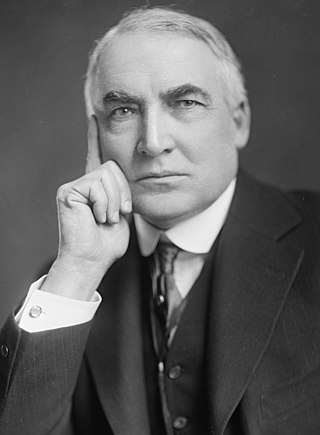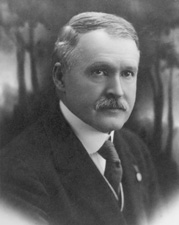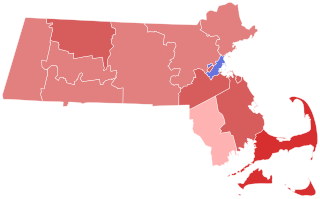History
The Republican Party controlled the United States Senate after the election of 1918, but the Senators were divided into multiple positions on the Versailles question. It proved possible to build a majority coalition, but impossible to build a two thirds coalition that was needed to pass a treaty. [1] One block of Democrats strongly supported the Versailles Treaty. A second group of Democrats supported the Treaty but followed President Woodrow Wilson in opposing any amendments or reservations. The largest block, led by Senator Henry Cabot Lodge, [2] comprised a majority of the Republicans. They wanted a treaty with reservations, especially on Article 10, which involved the power of the League of Nations to make war without a vote by the United States Congress. [3] The closest the Treaty came to passage, came in mid-November 1919, was when Lodge and his Republicans formed a coalition with the pro-Treaty Democrats, and were close to a two-thirds majority for a Treaty with reservations, but Wilson rejected this compromise and enough Democrats followed his lead to permanently end the chances for ratification.
Members
Those who have been identified as members of the faction include:
With the exception of Reed, Walsh, and Gore, all of the Irreconcilables were Republicans.
McCormick's position can be traced to his Anglophobia and nationalistic attitudes, Sherman's to personal antipathy to President Woodrow Wilson and his domestic policies. [6] Walsh, the Massachusetts Democrat, argued that the Treaty failed to address the "Irish question". [7] Most of the Irreconcilables were bitter enemies of President Wilson, and he launched a nationwide speaking tour in the summer of 1919 to refute them. However, Wilson collapsed midway with a serious stroke that effectively ruined his leadership skills. [8]
According to Stone's 1970 book, the Irreconcilables in the Senate fell into three loosely defined factions. One group was composed of isolationists and nationalists who proclaimed that America must be the sole commander of its destiny, and that membership in any international organization that might have power over the United States was unacceptable. A second group, the "realists", rejected isolationism in favor of limited cooperation among nations with similar interests. They thought the League of Nations would be too strong. A third group, the "idealists", called for a League with far reaching authority. The three factions cooperated to help defeat the treaty. All of them denounced the League as a tool of Britain and its nefarious empire.
Among the American public as a whole, the Irish Catholics and the German Americans were intensely opposed to the Treaty. [9]

Thomas Woodrow Wilson was an American politician and academic who served as the 28th president of the United States from 1913 to 1921. A member of the Democratic Party, Wilson served as the president of Princeton University and as the governor of New Jersey before winning the 1912 presidential election. As president, Wilson changed the nation's economic policies and led the United States into World War I in 1917. He was the leading architect of the League of Nations, and his progressive stance on foreign policy came to be known as Wilsonianism.

The 1920 United States presidential election was the 34th quadrennial presidential election, held on Tuesday, November 2, 1920. In the first election held after the end of the First World War and the first election after the ratification of the Nineteenth Amendment, Republican Senator Warren G. Harding of Ohio defeated Democratic Governor James M. Cox of Ohio. It was also the third presidential election in which both major party candidates were registered in the same home state; the others have been in 1860, 1904, 1940, 1944, and 2016.

Henry Cabot Lodge was an American politician, historian, lawyer, and statesman from Massachusetts. A member of the Republican Party, he served in the United States Senate from 1893 to 1924 and is best known for his positions on foreign policy. His successful crusade against Woodrow Wilson's Treaty of Versailles ensured that the United States never joined the League of Nations and his penned conditions against that treaty, known collectively as the Lodge reservations, influenced the structure of the modern United Nations.

Hiram Warren Johnson was an American attorney and politician who served as the 23rd governor of California from 1911 to 1917. Johnson achieved national prominence in the early 20th century. He was elected in 1916 as the United States Senator from California, where he was re-elected to five terms and served until his death in 1945.

William Edgar Borah was an outspoken Republican United States Senator, one of the best-known figures in Idaho's history. A progressive who served from 1907 until his death in 1940, Borah is often considered an isolationist, because he led the Irreconcilables, senators who would not accept the Treaty of Versailles, Senate ratification of which would have made the U.S. part of the League of Nations.

David Ignatius Walsh was an American politician from Massachusetts. A member of the Democratic Party, he served as the state's 46th governor before winning election to several terms in the United States Senate, becoming the first Irish Catholic from Massachusetts to fill either office.

Lawrence Yates Sherman was a Republican politician from the State of Illinois. He served as United States Senator, the 28th Lieutenant Governor, and as Speaker of the Illinois House of Representatives.

The Covenant of the League of Nations was the charter of the League of Nations. It was signed on 28 June 1919 as Part I of the Treaty of Versailles, and became effective together with the rest of the Treaty on 10 January 1920.

Selden Palmer Spencer was an American lawyer and politician. A Republican, he was a United States Senator from Missouri.

Woodrow Wilson's tenure as the 28th president of the United States lasted from March 4, 1913, until March 4, 1921. He was largely incapacitated the last year and a half. He became president after winning the 1912 election. Wilson was a Democrat who previously served as governor of New Jersey. He gained a large majority in the electoral vote and a 42% plurality of the popular vote in a four-candidate field. Wilson was re-elected in 1916 by a narrow margin. Despite his New Jersey base, most Southern leaders worked with him as a fellow Southerner.

The Lodge Reservations, written by United States Senator Henry Cabot Lodge, the Republican Majority Leader and Chairman of the Committee on Foreign Relations, were fourteen reservations to the Treaty of Versailles and other proposed post-war agreements. The Treaty called for the creation of a League of Nations in which the promise of mutual security would hopefully prevent another major world war; the League charter, primarily written by President Woodrow Wilson, let the League set the terms for war and peace. If the League called for military action, all members would have to join in.

The 1946 United States Senate election in Massachusetts was held on November 5, 1946. Incumbent Democratic Senator David I. Walsh ran for re-election to a fifth term in office, but was defeated by Republican former Senator Henry Cabot Lodge Jr., who returned from service in World War II.

The 1922 United States Senate election in Massachusetts was held on Tuesday, November 7. Incumbent Republican Senator Henry Cabot Lodge was re-elected to a fifth term in office over Democrat William A. Gaston.

The United States Senate election of 1942 in Massachusetts was held on November 3, 1942. Republican incumbent Henry Cabot Lodge Jr. was re-elected to a second term in office over Democratic U.S. Representative Joseph E. Casey.

The League to Enforce Peace was a non-state American organization established in 1915 to promote the formation of an international body for world peace. It was formed at Independence Hall in Philadelphia by American citizens concerned by the outbreak of World War I in Europe. Support for the league dissolved and it ceased operations by 1923.

The President's Room is one of the most ornate rooms in the United States Capitol, richly adorned with fresco paintings by Italian-Greek artist Constantino Brumidi. The room was completed in 1859 as part of the Capitol's vast extension, which added new Senate and House wings and the new cast-iron dome.

The 1920 United States Senate election in Connecticut was held on November 2, 1920.

The 1920 United States Senate election in Illinois took place on November 2, 1920.

The history of U.S. foreign policy from 1913–1933 covers the foreign policy of the United States during World War I and much of the Interwar period. The administrations of Presidents Woodrow Wilson, Warren G. Harding, Calvin Coolidge, and Herbert Hoover successively handled U.S. foreign policy during this period.

The foreign policy under the presidency of Woodrow Wilson deals with American diplomacy, and political, economic, military, and cultural relationships with the rest of the world from 1913 to 1921. Although Wilson had no experience in foreign policy, he made all the major decisions, usually with the top advisor Edward M. House. His foreign policy was based on his messianic philosophical belief that America had the utmost obligation to spread its principles while reflecting the 'truisms' of American thought.




















